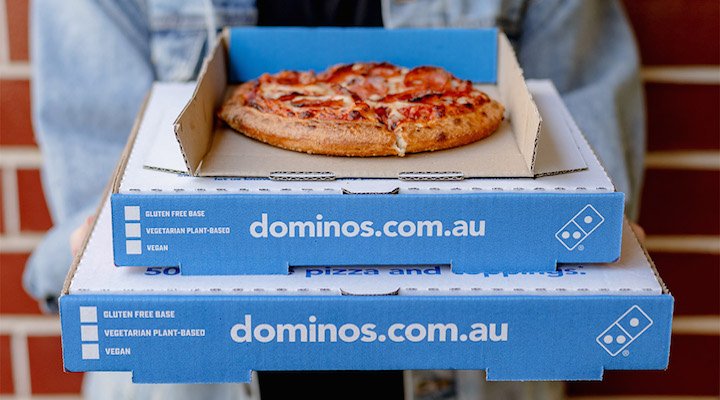Domino’s is to close up to 70 of its corporate-owned stores across its global network and exit the Danish market as part of a wide-ranging efficiency review.
In a stock exchange filing, the company said the right-sizing plan will incur between $80 million and $93 million in one-off costs but save the business $53 million to $59 million annually moving forward. That estimate excludes the cost of planned commissary closures in Southeast Asia and costs associated with “legacy IT assets”.
The company said the closures and streamlining would aid Domino’s “global reach and scale”.
Domino’s has commenced closing its 27 stores in Denmark, which it acquired through the receivership of the former owners in 2019 for €2.5 million. “Performance in this small market since has not materially improved,” Domino’s said in the statement, adding the closure would drive $12 million in immediate EBIT improvement.
The previous owners had attracted widespread negative publicity for the brand, breaching public trust with multiple food-safety violations that undermined public confidence in its food.
Europe CEO Andre ten Wold said the new Danish team had consistently delivered some of the highest quality operations in the QSR industry with every store maintaining recognition from local authorities for high-quality food safety and hygiene.
“While our team’s efforts won back some customers, and created loyal fans, the legacy of damage from the previous ownership was ultimately too great for us to overcome in the foreseeable future,” he said.
Further store closures
Elsewhere, the closure of up to 20 per cent of its corporate-owned network of 913 stores equates to only about 2 per cent of its global network of 3827 stores. Between 65 and 70 stores will close, all underperforming outlets “open for some time but not expected to reach sustainable levels of sales or profitability in the near term”.
Franchisees will be sought for another 70 to 75 corporate stores described as being in “turnaround” status.
“Making the decision to close any store is a difficult one, but for these stores, it is the right one,” said group CEO & MD Don Meij.
“The investment and focus required is a drag on neighbouring stores and a distraction for the system.”
In Australia, Domino’s is reviewing its business units to identify efficiencies “including realignment of business structures, simplification of systems and removal of operational areas that are not core to our future growth”. That includes the immediate closure of its Brisbane-headquartered Construction and Supply Services subsidiary.
In Asia, commissaries – where pizza dough was prepared and shipped to stores – will be progressively closed, a move the company says was always part of the planned acquisition integration of the businesses in Taiwan, Malaysia, Singapore and Cambodia. Having each store prepare dough in-house is expected to improve product quality, supply chain resilience and reduce costs.
“Any inefficiency is a burden on the system as a whole; streamlining our business allows our franchisees to focus on delivering the best possible customer experience, growing sales and profitability, and expanding their business,” said Meij.
“The decisions of today will immediately deliver a stronger business and improve efficiencies for the long term. As these initiatives are completed and deliver savings, we intend to reinvest approximately one-third of these savings to stores, as we reinvest in the franchise network base,” he said.
“Domino’s Pizza Enterprises has a long-term plan, including building out the sizeable opportunity we have in Europe and the Asia-Pacific to more than double our business.
“This is the right time for us to redesign for future growth; we are taking deliberate action to bring more focus to our business, removing distractions and maximising the benefits of our global reach and scale.”
Same-store sales improve
Meanwhile, Domino’s has reported that same-store sales rose by 3 per cent during the latest quarter (excluding Taiwan) and the company – together with franchisees – is focused on growing weekly order counts to deliver stronger store profitability.
The company said the rebuilding of weekly orders – especially deliveries – has been slower than anticipated and underlying second-half pre-tax earnings growth is no better than during the first half.






